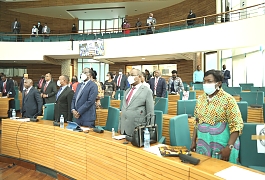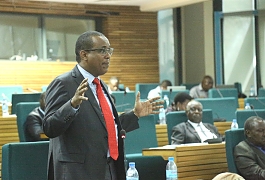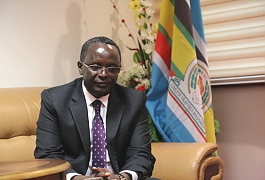The regional Assembly is calling for urgent measures to raise the bar on education standards and to maintain quality control as the EAC strives in its quest to harmonise curricula, Speaker, Rt. Hon Daniel F. Kidega has said.
The EALA Speaker recently received a delegation of officials from a regional civil society think-tank, Twaweza, led by the Executive Director, Aidan Eyakuze and launched a report on the state of literacy and numeracy in the region.
The findings of the report dubbed: Are our Children Learning – Literacy and Numeracy across East Africa were later shared to EALA Members, Thursday, last week.
The report presents evidence from data collected in Kenya, Uganda and Tanzania in the year 2013. In all three countries, the Uwezo Assessment reached a total of 326,610 children aged between 6-16 years in 366 districts and was carried out in a random sample of about 150,000 households. For every household, a short set of questions was administered to collect basic information. The enumerators then recorded details about the child whether he/she attends school and which grade.
Mbeya District in the United Republic of Tanzania is ranked first out of the 366 districts where the research was done with a mean pass rate of 86.1% on combined test for all children aged between 10-16 years while Gatundu District in Kenya, takes second position with 85%. Nyeri North (Kenya), Nairobi and Laikipia East complete the first top five spots on the regional log respectively. Kampala District which tops in Uganda is placed at position 82 regionally with a mean score of 64.7%. Bukoba Urban comes second in Tanzania and 12th regionally with 79.7% and is followed in 3rd position by Arusha District which ranks 19th in the regional bar. In Uganda, Mbarara takes the 2nd position nationally and is placed at number 118 regionally while, Wakiso District at position 121 regionally is 3rd in the national ranking.
According to the Report, two out of three pupils enrolled in Standard 3 in East Africa do not have Standard 2 level literacy or numeracy skills. Even more worrying is the fact that one out of four Standard 7 pupils do not have Standard 2 literacy and numeracy skills. The Report states that about 25% of Standard 7 children remain unable to pass the literacy and numeracy UWEZO tests set at the Standard 2 level.
The collection of data was led by Twaweza Director, Dr. John Mugo (Kenya), Team Leader, Dr Mary Goretti Nakabugo (Uganda) and Country Co-ordinator, Ms. Zaida Mgalla (Tanzania).
Presenting the findings, Dr. Mary Goretti Nakabugo reiterated the need for a strong foundation in education noting that was the only way to sustainable education.
"It is shocking that students in University are failing to construct simple sentences," the don added.
Twaweza Kenya Country Co-ordinator, Dr. Emmanuel Manyasa stressed the need to have value in money spent in the education sector while Zaida Mgalla, Country Co-ordinator, Twaweza, Tanzania, said it was not time to celebrate the soaring enrollment levels but rather that it was key to have children stay in school and to learn.
The report further reveals that there are large differences in test results among countries in East Africa as is the case with pass rates between districts within individual countries. In essence, the report suggests that there has been little change in learning outcomes since the regional assessment started in 2009/10. The report states that learning outcomes are highest in Kenya and lowest in Uganda. Within each country, learning outcomes are best in the urban and more developed districts and worst in the remote, rural districts.
"Evidently, completing six years of schooling does not necessarily translate into genuine learning for many pupils", the Report states in part.
The authors of the report hope the results shall provide meaningful evidence to accompany the various efforts, both public and private, that seek to improve learning across the region.
According to the Twaweza Executive Director, Aidan Eyakuze, focus in region should be on learning and quality.
"The progress made to increase access and gender parity is to be commended. However we must ensure that the national figures do not hide local variations. Although this does not mean we need to abandon or ignore access issues, these data clearly show that the core focus for East African education over the coming years should be about quality and ensuring that children are in school and they are learning.", Mr. Eyakuze said.
EALA Member Hon Martin Ngoga called for wider net to include Rwanda and Burundi in the future surveys and called on the Partner States to revisit their policies to enhance education.
In her remarks, Hon Judith Pareno regretted that poverty was a major factor to poor education. “…rather than bridging the gaps, Uwezo results show that through our education, the poorer we are, the poorer we become. What then, if not education, will the poor hold onto? Does it mean that all the poor must move into the cities for their children to learn?” She noted that the debate needs to be sustained.
Hon. Abubakar Zein said the region needed to rid itself of discrimination in education especially when it comes to women and children from poor family. Hon. Hafsa Mossi talked about the importance of education and worried over the inability of graduates to express themselves. She noted that the number of girls dropping off from school because of pregnancy and marriage was a big problem in the region.
The region was challenged to improve the quality of education. “Why are the education standards in Europe and other western countries better than ours? is it that Africans do not have good teachers and good schools or what we are lacking?” pondered Hon Leonce Ndarubagiye. He remarked that bad performance in many schools in the continent was also as a result of corruption, poverty and lack of motivation in the education sector.
"We need to urge Governments and the Private Sector to highly motivate the teachers and educators", he said.
Hon. Patricia Hajabakiga urged Partner States to strive to ensure the budget in the education sector was commensurate with the populace so as to meet the actual demand.
-ENDS-
NOTES TO EDITORS
About Uwezo
Uwezo, meaning ‘capability’ in Kiswahili, is housed in and managed by Twaweza. Uwezo conducts an annual learning assessment of children aged 6 to 16 in Kenya, Tanzania and Uganda. The data collected are representative to district level due to the large sample size. Uwezo aims to spark national and local debate on learning outcomes to galvanise change.
About Twaweza
Twaweza means “we can make it happen” in Swahili. Twaweza works on enabling children to learn, citizens to exercise agency and governments to be more open and responsive in Tanzania, Kenya and Uganda. Twaweza has programs, staff and offices across all three countries, and a world respected practice of learning, monitoring and evaluation.
For more information, contact
Bobi Odiko,
Senior Public Relations Officer,
East African Legislative Assembly.
Tel: +255-27-2508240
Fax: +255-27-2503103,
Cell: +255-787-870945 +254-733-718036.
Email: BOdiko@eachq.org
Web: www.eala.org



